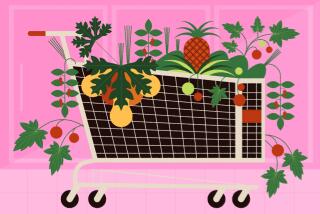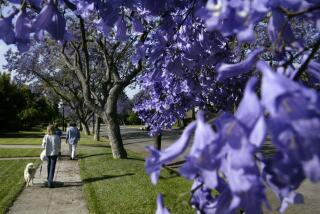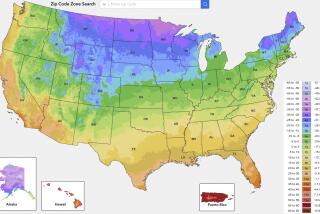Challenges for gardeners in an unforgiving season
My calendar says my summer vegetables should be harvested by now. It’s time for cool season crops to go into the ground.
But it feels weird gearing up for winter while we’re coming off a blistering week of triple-digit heat. And it’s disappointing to give up on a summer garden that, for all my good intentions, was mostly a flop.
I’m beginning to suspect that gardening — in heat, drought and uncertain soil — is more complicated and less fulfilling than I thought. As much as I like to fancy myself the Mother Earth type, I’ve begun to wonder if my green thumb has turned brown.
Last year, I waxed rhapsodic about the glory of gardening. A garden, I said then, is a metaphor for life. It thrives with good planning, proper nourishment and careful cultivation. My haul of tomatoes and zucchini last summer seemed to bear that out.
This year I learned that you can rely on that formula and still come up short. I was outwitted by weather, insects, hungry raccoons and my own ignorance. Apparently — according to the experts I belatedly consulted — I overplanted, underwatered and inconsistently tended plants that may have needed more nitrogen than love.
Now all I have left of my three briefly verdant raised garden plots are a few spindly stalks of okra, a tangle of barren melon vines and a pepper plant loaded with misshapen pods that no one in my family likes.
And as soon as I finish writing this column, I’m pulling all of them out — and dumping them in my newly created backyard compost pile.
::
Veteran gardener Missy Gable said I shouldn’t feel discouraged because my plants failed to thrive. This has been a tough year for gardeners all around.
Gable is the director of the state’s Master Gardener program. Still, her homegrown tomatoes wound up with blossom end rot when the parched soil in her Sacramento yard soaked up water unevenly.
“I had the same type of experience that most people did,” Gable admitted. She tried to be efficient, with a mix of drip irrigation and hand watering. But even an expert can be undone by the weather’s vagaries.
We’re all mindful of the need to conserve water in what’s shaping up as the hottest and driest year in California history. That can make dousing a garden with water seem wasteful and vaguely subversive.
By midsummer, as my peas shriveled, my cucumbers wilted and my water bill skyrocketed, I began to wonder if my garden was just a costly self-indulgence. I’d spent hundreds on raised boxes, organic soil and ergonomic gardening tools — and had nothing beyond a pair of stiff knees and a few baskets of tomatoes to show for my investment.
Was my garden contributing to our water-parched state’s problems or was it part of the solution?
::
That’s a question that many gardeners are asking at this point in what has been an unforgiving season.
“A lot of people are calling and want to rip out their whole garden and just put in native plants,” said Janet Hartin, an environmental horticulture advisor with the University of California’s agriculture and natural resources program.
But vegetables are well worth the water it takes to grow them, she and Gable said.
If you’re planting a garden for the first time, your water use will rise. “But by growing fruits and vegetables, you’re decreasing your carbon footprint,” Gable said. “You’re not using pesticides, not making trips to the grocery store.... The environmental and health benefits of home gardens are lasting and important.”
She ticked off several ways to make gardens more productive and water-wise and less labor intensive:
Add compost to the soil to provide nutrients and increase water-holding capacity. Rig drip irrigation systems so they don’t waste water on bare ground. Insulate the ground between plants with layers of hay or shredded bark as mulch. And do your homework on growing seasons and climate needs before you decide what to plant.
She steered me to a bevy of experts who take questions by email and phone through the University of California’s Cooperative Extension Master Gardener program. I’ve bookmarked local planting guides and advice online at https://www.ucanr.edu
I’m trying not to consider this summer project a failure. It looked spectacular in its prime, and more than once I made meals that drew entirely upon my harvest.
Still, I’ll be better prepared the next time around. I’ve already worn a path from my kitchen to the compost bin in the yard. I’m hauling home bales of hay this weekend from the feed store near my house. And before this season’s first rain falls, I’ll install a cistern to collect the water.
I’ve realized that gardening is more than a labor of love, and it’s not a job for dilettantes.
Twitter: @SandyBanksLAT
More to Read
Start your day right
Sign up for Essential California for news, features and recommendations from the L.A. Times and beyond in your inbox six days a week.
You may occasionally receive promotional content from the Los Angeles Times.







